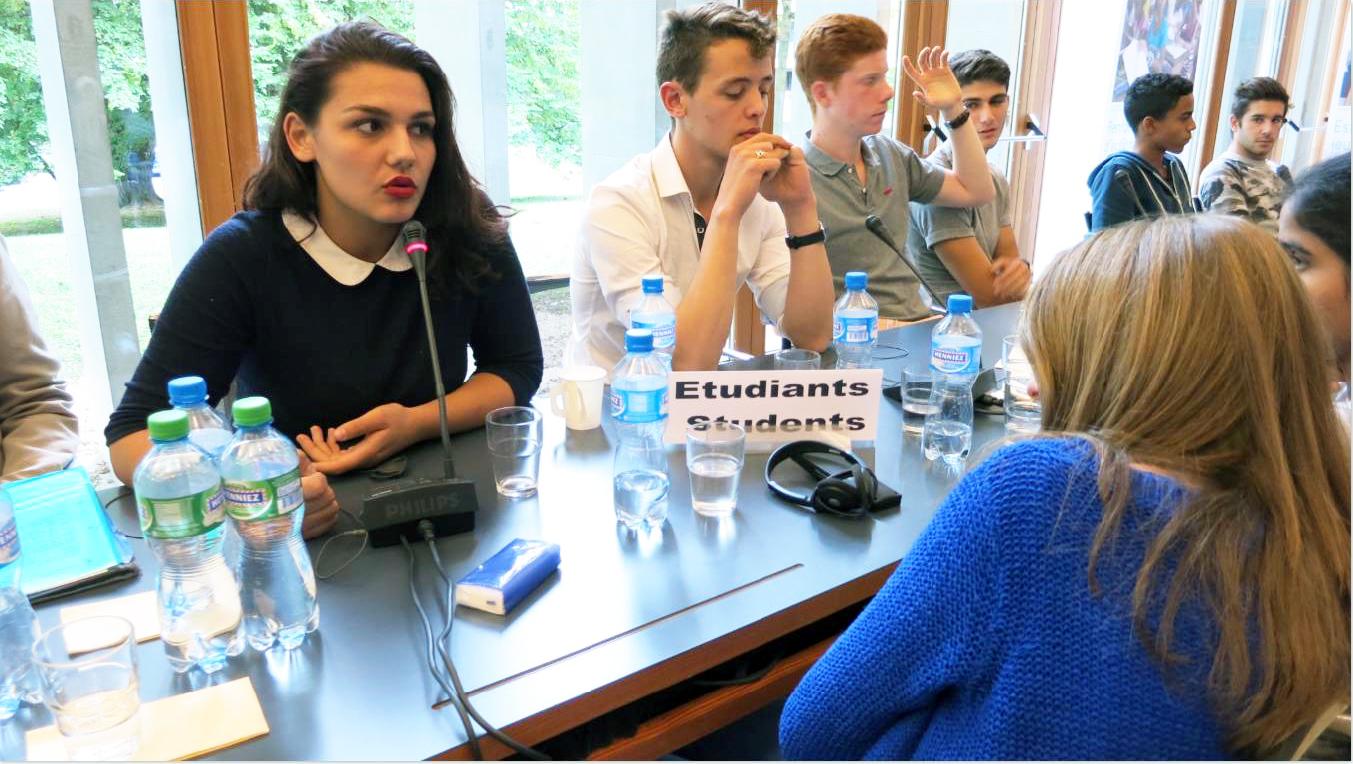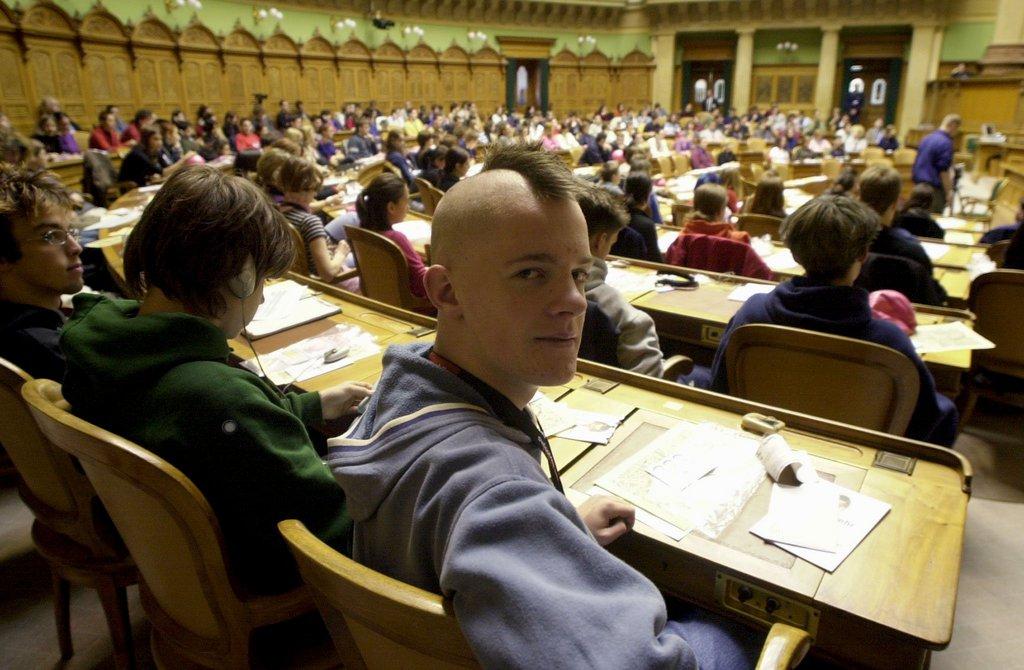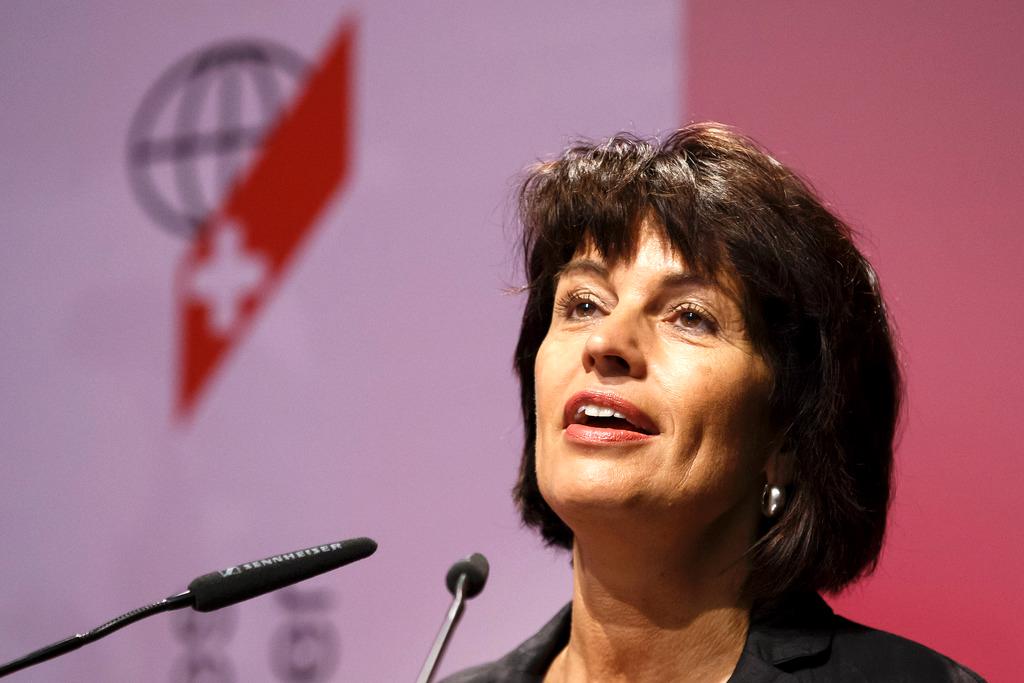Gathering of would-be politicians encourages Swiss participation
The youth parliament, an experiment in grooming youth for politics, could be an antidote for Switzerland’s widespread disinterest in public service, proponents and experts say.
Just ask Noemi Ganarin, who at 18 is president of the youth parliament in the northern Swiss community of Wohlen. Along with the teamwork, the “super cool” experience of meeting people from throughout Switzerland and the opportunity to improve her debating skills, Ganarin calls the youth parliament “a good way to gain your first experience but without the commitment of having to join a party”.
Some do go on to commit themselves, such as Lisa Mazzone, who got her political feet wet as part of the youth parliament that she co-founded in the Geneva suburb of Versoix. She went on to join the Green Party and, in October, at the age of 27, became the youngest Swiss to win a seat in parliament.
Turnout among the youngest Swiss voters has fallen to 34% in federal elections, but it is only at 49% among the broader population. And, despite the nation’s prosperity and status as a peaceful bastion of direct democracy, many Swiss communities struggle to enlist citizens in public service.
Launched in 1991 as part of the celebration for the 700th anniversary of the Swiss confederation, the youth parliament could change that. It meets on Sunday, and is giving some 1,500 participants their first taste of politics. People between the ages of 14 and 21 are encouraged to gather for sessions in which they are divided into work groups and charged with preparing petitions.
Maurus Blumenthal, who has led the youth parliament for the past several years, says that along with the fun and experience gained from making proposals, gaining and giving advice and launching projects, it appears to be boosting involvement in Swiss politics.
“We have case studies that show that in places where there is a youth parliament, there is greater willingness among former members to become councillors in the future. This is the case in Interlaken, as well as the Bernese Oberland, for example,” he said, highlight its impact on less densely populated areas.
Other research has found that Swiss youth are highly interested and involved in Swiss politics, but their discussions often take place through channels other than those used by adults – more often informally among friends and family, or via social media and instant messaging networks.
Lots to talk about
Swiss voters usually are asked three to four times a year to decide on a wide range of issues as part of their democratic rights. The balloting occurs nationally and on the cantonal and local levels.
Up-and-coming politicians usually set their sets on becoming members of parliament. The 46 senators and 200 elected members of the House of Representatives converge on the capital four times a year for three weeks at a time to attend parliamentary sessions, and go to committee meetings at other times of the year.
Most keep up jobs outside of parliament, making them part of what is commonly referred to as the Swiss “militia” system of politics. Only top-tier Swiss politicians, such as those in the seven-member cabinet of ministers who take turns being president for a year, are paid as full-time professionals.
Even if they don’t all go on to federal elections, proponents of the youth parliament say its ex-members are more likely to take over political responsibilities within their communities.
“For young people who want to be actively involved in their community, city or canton, the Swiss youth parliament offers a practical opportunity to promote political and societal change,” said Blumenthal, who has led the DSJ for the past three and a half years.
Georg Lutz, a professor of political science at the University of Lausanne, says the youth parliament provides a training ground for young people to offer initiatives, debate their merits, and make decisions – experiences that can be used to launch a political career.
The value of that sort of practical experience is illustrated by Ganarin and others between the ages of 15 and 25, such as Laurent Christ and Adrian Willi.
“There is a real sense of community. I really enjoying meeting up with cool people and implementing projects every six weeks,” said Christ, a 17-year-old who has been a member of the youth parliament in Köniz, a community in the Bern suburbs, for the past three years.
He says members of the youth parliament have been allowed to present their projects to community leaders on occasion, leading to real changes such as a sports night, expansion of the night bus route, and a clothing-exchange box in the community library.
For 18-year-old Willi, a commercial apprentice, it was first necessary to join a core group of six people responsible for setting up a youth parliament in the Bernese Oberland, which has existed since last summer.
“In a rural region such as the Bernese Oberland, the youth parliament takes on special significance because many communities here are trying to stop the exodus of young people. They are very interested in the question of how to keep the young,” Willi said.
“It’s preferable if young people can express what it is they need in order to stay, rather than leaving it to older generations to decide,” he added.
According to Blumenthal, a youth parliament is something of a cross between a legislative and executive authority. He points to the sports night in Köniz as an example, since members of youth parliament first pitched the idea and then, after gaining approval for it, organized the regular sport nights in gymnasiums.
Developing the next generation
Many communities in Switzerland today can’t find enough citizens prepared to serve the public through their participation in a district council or governmental committee.
“While the development of young talent is an important issue in football clubs and the business world, the fact that communities must also do so is often not clear,” said Blumenthal. Some of the options for changing that, he said, are to be more inclusive of women and to reach out to young adults and youth.
“Our long-term vision is to raise the voting turnout of young people aged 18 to 25 from 34% to 40%,” Blumenthal added.
As part of that goal, proponents of the youth parliament have organised a project called Easyvote, which turns the usually dry language of politics into something more vibrant for youth, and then spreads this material through multimedia platforms. A new platform called Engage is still being tested as a way for young people to share their concerns and ideas.
Questions of representation and legitimacy
To Lutz, there are still issues to be worked out about how members are chosen for youth parliament. It is not uniformly determined who becomes a member, he said, which can lead to questions of legitimacy.
“To put it bluntly”, he said, “I can’t create a youth parliament with friends and then claim special rights and issue demands to the municipal or cantonal parliaments.”
Blumenthal, however, said the youth parliament is usually organised according to public law, similar to a local construction commission with a public mandate.
Lutz said the Easyvote project is commendable because it translates “dry content into a better and therefore more attractive language for young people”, but he wants to see some hard figures to show that it really is a success at attracting more youth to the polls.
“I am sceptical in general when it comes to measures that aim at increasing turnout,” he added.
Adapted from German by Catherine McLean and John Heilprin

In compliance with the JTI standards
More: SWI swissinfo.ch certified by the Journalism Trust Initiative




You can find an overview of ongoing debates with our journalists here . Please join us!
If you want to start a conversation about a topic raised in this article or want to report factual errors, email us at english@swissinfo.ch.